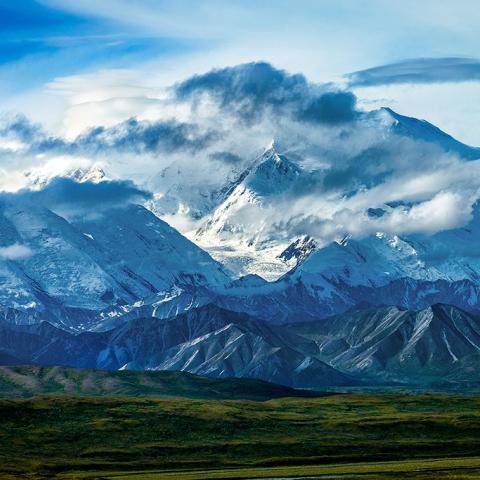
Alaska officials want greater control over wildlife in their state, even in national parks such as Denali/NPS
Alaska's ability to properly manage fish and wildlife in the state is being hindered by "national policies which simply do not recognize the unique management situation in Alaska," according to its new governor.
In a letter sent to acting Interior Secretary David Bernhardt, the state's acting Fish and Game director included a 42-page list of recommendations that would give the state greater authority in decisions pertaining to wildlife management on federal lands, including national parks and preserves.
"Despite the special Congressional compromises in ANILCA (the Alaska National Interest Lands Conservation Act) which established or redesignated all of Alaska's national park system units and wildlife refuges, it has become increasingly difficult for the public to hunt and trap, and for the State to conduct its every day work, in park units and refuges in Alaska," wrote Doug Vincent-Lang last week.
Before he resigned last month, Interior Secretary Ryan Zinke had worked to give states more authority over wildlife management on federal lands. In September he directed the National Park Service and other agencies under his purview to defer wildlife and fisheries matters to states. In that memo he said that he "reaffirms" a 1983 policy that gives the states the authority "to exercise their broad trustee and police powers as stewards of the Nation's fish and wildlife species on public lands and waters under the jurisdiction of the Department."
Possible issues that could arise under that directive include Yellowstone National Park's management of bison, which has created conflicts with Montana interests, and in Denali, Katmai, Wrangell-St. Elias and other units in Alaska, where the state has worked at times to reduce predators such as wolves to reduce their predation on moose and caribou.
Earlier in 2018 Zinke told Park Service staff in Alaska to relax sport hunting regulations for wolves and bears in national preserves in the state. Specifically, he wanted new regulations regarding predator control to align with state rules that were implemented to suppress carnivore numbers in order to increase game populations. The revised rules, which the Park Service banned in 2015, would allow:
* Taking any black bear, including cubs and sows with cubs, with artificial light at den sites
* Harvesting brown bears over bait
* Taking wolves and coyotes (including pups) during the denning season (between May 1 and August 9)
* Taking swimming caribou
* Taking caribou from motorboats under power
* Taking black bears over bait
* Using dogs to hunt black bears
In his 42-page attachment, Vincent-Lang specifically referenced that last matter, urging Interior to adopt the state's rules for predator control. Sticking with the 2015 regulations, he wrote, "significantly alters the public participation procedures for Alaska park units, making it easier for the NPS to close or limit all uses in Alaska park units with limited or no public engagement for extensive, indeterminate periods of time, impacting consistency with state regulations and increasing the complexity of the regulations for the public."
Alaska's new governor also wants the National Park Service to, among other things, stop treating wilderness eligible lands and lands proposed for wilderness designation as if they already were wilderness.
"In Alaska, this means an additional, unnecessary layer of permitting and restrictions on state fish and wildlife monitoring, research, and management activities on the 17.7 million acres of NPS land administratively classified as eligible wilderness," wrote the acting director. "Further, this requirement applies to proposed wilderness in Alaska even though the wilderness reviews conducted by the NPS in the 1980s were never forwarded to Congress for consideration."
Alaska officials also object to the Park Service's reliance on the precautionary principle, which says stewardship decisions should reflect science-informed prudence and involve restraint before acting with unknown consequences.
"Use of the precautionary principle has resulted in unnecessary restrictions on public hunting and fishing as well as state fish and wildlife management activities in Alaska," the state said. "It also places the state in the difficult and impractical position of proving a negative, rather than explaining possible effects and their likelihood according to the available science in order to inform decisions."
At Public Employees For Environmental Responsibility, which released the correspondence, Executive Director Jeff Ruch said that while federal lands are to be managed for all Americans, the administration of Gov. Mike Dunleavy, who took office in December, "is telling the federal government, give us your money but stay the hell out of our state.”
In a press release PEER also said that, "(T)he most recent state analysis found that wildlife tourism had more than twice the economic value to Alaska as hunting. Hunting and trapping outside Denali National Park and preserve, for example, has greatly reduced visitor success in viewing wolves in the wild – one of Alaska’s biggest tourism draws."




 Support Essential Coverage of Essential Places
Support Essential Coverage of Essential Places







Comments
I will help support to keep Alaska's national parks as well as the Arctic safe because nobody wants oil drilling in that area anyways because it is dangerous and we need to protect the wildlife no matter what and Trump is a big fat liar when it comes to him asking to oil drilling in areas we don't want to happen. Keep supporting to protect Alaska and its national parks and I'll always be here for you to help support you. Thank you!
Perhaps the governor and his hack of a commissioner should review Hughes v Oklahoma (Google it) and the hundreds of federal cases that have referenced/upheld it since 1979. And then when finished they can consider whether Congress can override the Tenth Amendment by simple legislation. Even if you read ANILCA to say that Congress is passing trust responsbility for wildlife on federal lands to the state, that part would be unconstitutional.